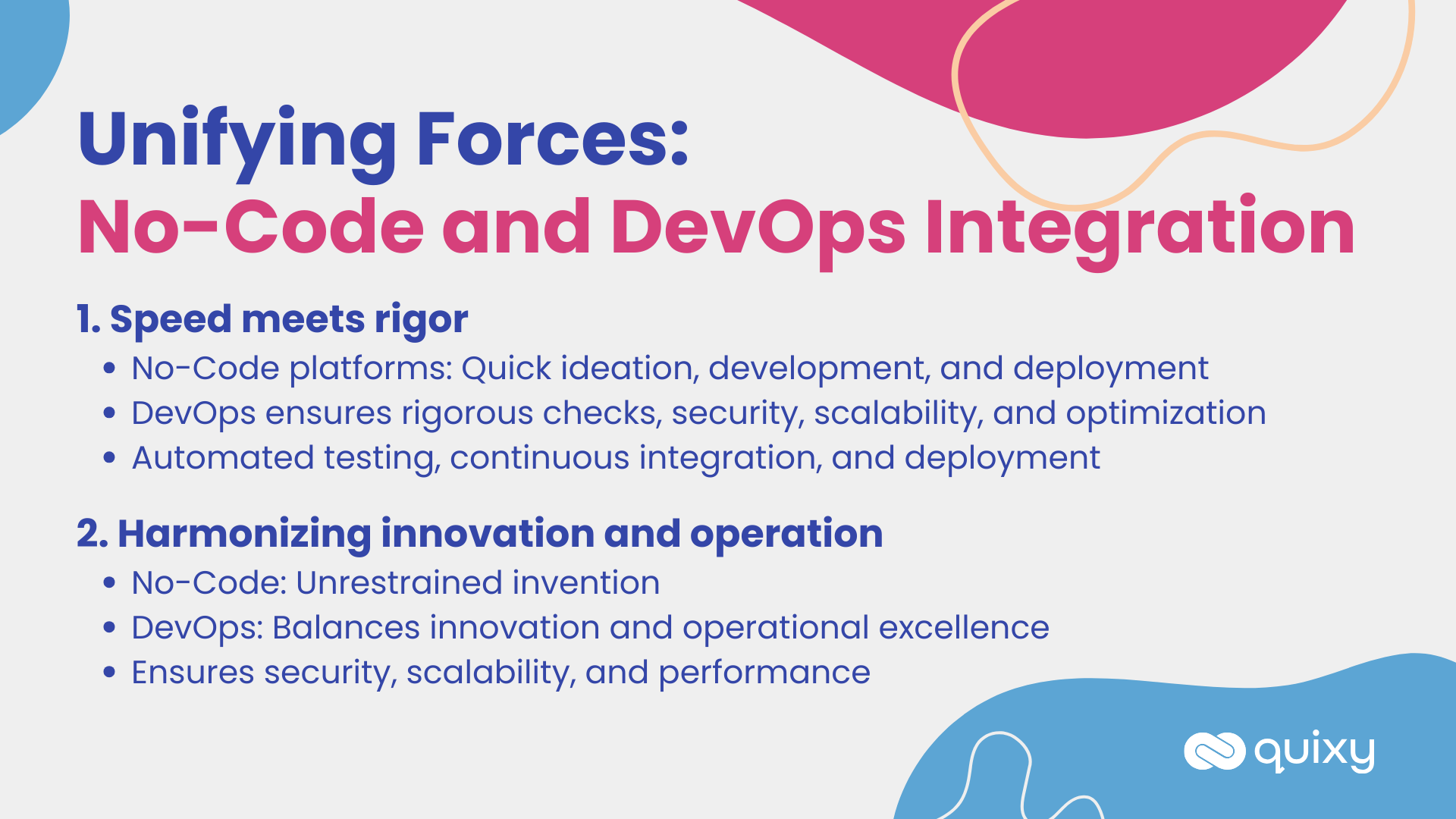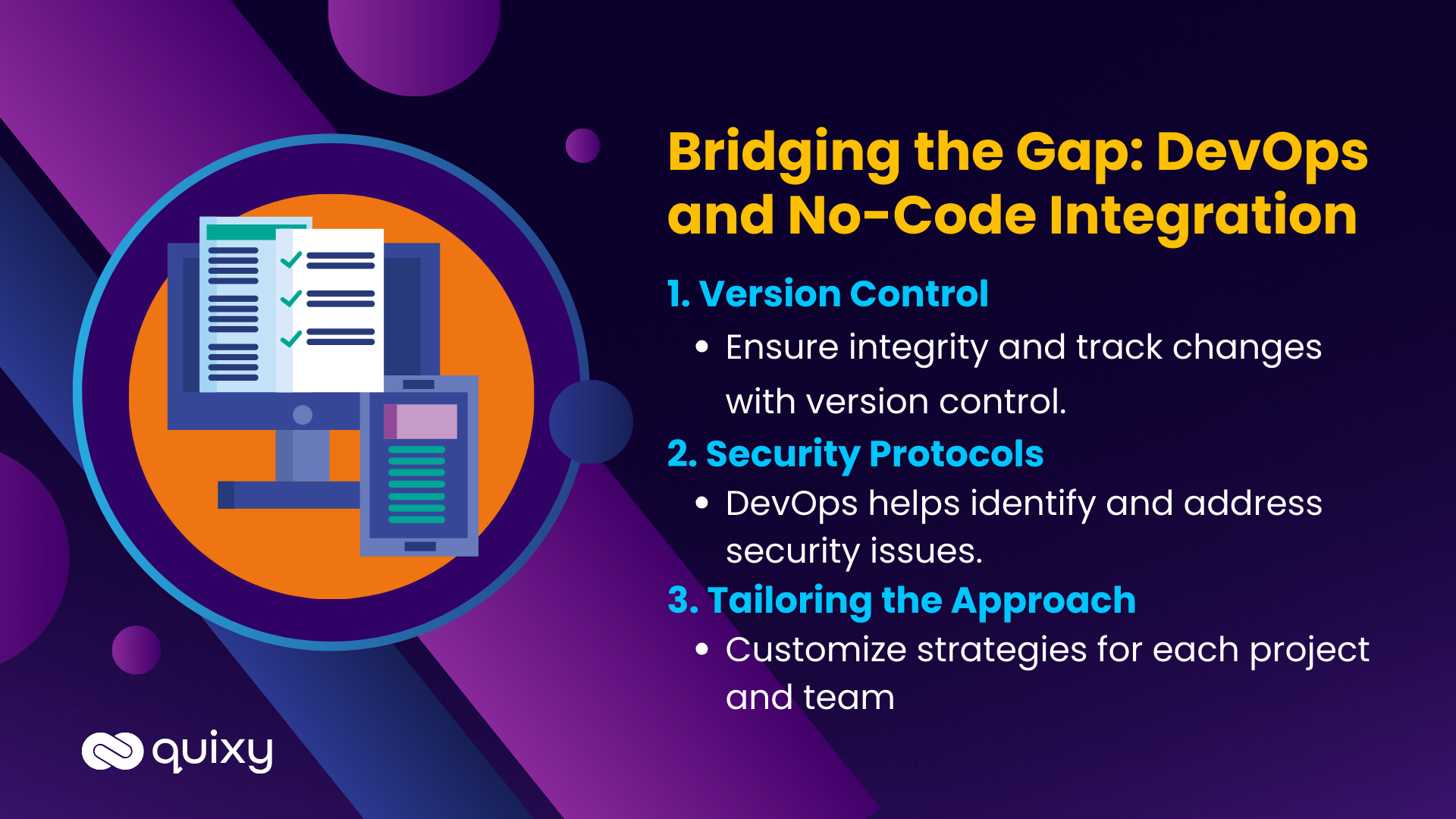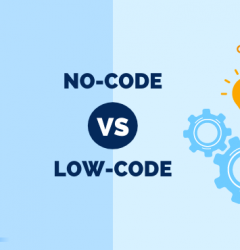
The No-Code movement is rapidly gaining popularity in the software development field. It represents a way of creating complex applications without the need for coding. These platforms empower individuals, including those without technical expertise, to design, build, and launch their own applications. This democratization of app development has resulted in increased innovation. Decreased barriers to entry. The flexibility and ease of use offered by no-code platforms are undeniable. However, this revolution also raises questions about the roles in software development, especially regarding DevOps. Let’s learn more about how the dynamic intersection of DevOps practices and No-Code, enhances productivity and efficiency in software development.
This article aims to shed light on the future in a world where DevOps and the no-code movement coexist. We will examine the synergies that can be tapped into as we delve into the complexities of integrating DevOps inside the no-code ecosystem. Accelerated development cycles, improved security, and increased operational effectiveness are all promised by the combination. We will also discuss the difficulties that result from this junction, such as potential conflicts, problems with flexibility, and changes in the skill sets needed to operate in this hybrid context.
The Intersection of DevOps Practices and No-Code
The goal of DevOps is to shorten the systems development life cycle and provide continuous delivery. DevOps is a set of practices that integrates software development (Dev) and IT operations (Ops). It places a strong emphasis on automation, teamwork, and monitoring throughout an application’s lifecycle. The function of DevOps is frequently questioned as a result of the development of no-code platforms. What role does DevOps play if traditional ways of writing code are no longer used?
In contrast to the idea that DevOps is deemed unnecessary in a no-code environment, this article asserts that its function is crucial and not just still useful. Even while no-code platforms make the development process simpler, scalable infrastructure, effective procedures, and improved security standards are still required.
The much-required integration
No-Code platforms have expanded the possibilities, sparking an innovation and application gold rush. They have created an environment where being able to prototype and deploy quickly is now a substantial competitive advantage. Development is no longer limited to the specialized knowledge of traditional programmers in this burgeoning environment.
However, this pace and democratization of development beckon the need for a structured, disciplined approach to ensure that the speed does not compromise the quality and security of the applications. This is where the integration of DevOps becomes indispensable. It’s a mediator that harmonizes the rapid innovation of No-Code with structured operational efficiency, ensuring that applications are not just created quickly but are also robust, secure, and scalable.

1. Speed meets rigor
No-code platforms allow for quick ideation, development, and deployment cycles, which is a notable improvement over the conventional, frequently time-consuming software development processes. However, this speed can occasionally result in mistakes, especially in crucial areas like security, scalability, and maintenance that are vital to the long-term viability of programs.
DevOps fills these gaps by stepping in. It makes sure that the applications created via quick no-code processes are put through rigorous checks, balances, and optimizations. Every application is examined for performance, security, and scalability using automated testing, continuous integration, and continuous deployment, three key principles of DevOps. DevOps basically plays the role of the watchdog, making sure that the innovations unleashed by No-Code platforms are viable and follow accepted industry practices.
2. Harmonizing innovation and operation
No-Code ushers in an era of unrestrained invention where concepts can easily become useful applications. On the other side, DevOps makes sure that these apps are designed to endure the test of time while striking a balance between innovation and operational excellence.
For instance, a No-Code platform can make it possible for a small team to build a feature-rich application quickly. However, the application could encounter security, scalability, and performance issues without the incorporation of DevOps practices such as automated testing, monitoring, and deployment, eventually impacting user experience and organizational reputation.
Also Read: What do No-Code Platforms do for Traditional Developers?
Data insights: A closer look
The growing use of No-Code platforms shows a larger paradigm shift in software development. According to a recent survey, over 71% of developers said their companies either now use or want to use No-Code solutions. No-Code is at the center of producing both customer-facing and internal applications, proving its mettle and significant impact on the industry. This is not a niche trend or limited to ancillary initiatives.
1. A deeper examination
No-code adoption goes beyond the promise of simplicity and speed. These platforms are being used by businesses because they improve cooperation, cut expenses, and attract a more varied talent pool. They are effective allies in creating complicated, reliable, and scalable applications; they are not merely tools for simple or quick solutions. No-code threads are progressively being weaved into the tapestry as the fabric of software development is being rewoven.
2. The misconception
In spite of this, there is still a misunderstanding that the emergence of No-Code portends the end of DevOps. This impression is a result of the streamlined procedures that No-Code introduces, which appear to make conventional operating and development procedures obsolete. A more thorough examination of the landscape reveals a more nuanced story, though.
No-Code platforms do not live in a vacuum, notwithstanding how revolutionary they are. They are not magic solutions that solve all problems related to the creation and deployment of applications. Governance, security, scalability, and efficiency problems still exist. Although advantageous, the democratization of app development also leaves room for potential inconsistencies, weaknesses, and quality issues.

Bridging the gap: DevOps and No-Code
The gap between quick development and operational excellence is becoming increasingly obvious as the No-Code movement gains momentum. Rapid application development is a priceless advantage, but without the supporting frameworks to guarantee these applications are reliable, scalable, and effective, this asset can rapidly turn into a problem. Here, combining DevOps techniques with No-Code development is not only advantageous but also necessary. With this combination of No-Code development’s agility and DevOps’s structural and operational rigor, creativity is not only fostered but also made reliable and sustainable.

1. Version control
Version control is a crucial component that rigorously tracks and controls project changes as we delve into the core DevOps practices. This practice is essential in the world of No-Code, not a luxury. No-Code platforms enable a wider range of people to participate in program development, but managing modifications becomes more difficult and risky as a result. Every alteration is monitored, recorded, and, if required, undone via version control in the No-Code environment, preserving the integrity of the application.
For teams – from the nimble units in startups to expansive squads in large enterprises – version control is the linchpin that fosters collaboration while mitigating the risks associated with rapid development cycles. It acts as the silent sentinel that oversees the dynamic landscape of application changes, ensuring that innovation is matched with consistency and reliability.
Also Read: The Secrets of App Development: Building Excellence
2. Security protocols
Another area where the fusion of No-Code and DevOps is vital and relevant is security. With No-Code platforms, application development is made more accessible, which could result in vulnerabilities if properly managed. DevOps’ core practice of static application security testing turns out to be a crucial ally. It guarantees that applications, although being quickly produced, are examined for any security problems and are in compliance with laws and standards.
3. Tailoring the approach
However, flexibility is essential in this dynamic integration. Combining DevOps and No-Code in a rigorous, one-size-fits-all manner is not only ineffective, but it may also be harmful. A tailored strategy is required due to the diversity of No-Code platforms, the variety of application architectures they produce, and the eclectic mix of team capabilities.
Each DevOps integration within the No-Code area ought to be as special as the team and the project in charge of it. Tools and methods need to be carefully chosen, modified and merged. For instance, while GitHub is a mainstay for conventional programmers, non-technical contributors may find it intimidating due to its intricacy. Platform-specific DevOps solutions can fill the gap in this situation by providing the structural integrity and oversight of conventional practices with user interfaces and workflows that are clear and simple to understand.
In the following sections, we’ll further dissect these dynamics, offering insights, strategies, and case studies that illuminate the pathway to harmonizing the agility of No-Code with the operational excellence of DevOps. This is a journey to a landscape where innovation is not just rapid but is also robust, secure, and poised for long-term impact.
Quixy’s approach to integration
Quixy has become a key participant in a world where technological ecosystems are as diverse as the organizations they support, providing a no-code platform that works in concert with DevOps to build apps that are not just cutting-edge but also grounded in operational excellence. We comprehend the dynamic dance between the rigor provided by DevOps and the creativity unleashed by no-code development.
1. Customization and flexibility
At Quixy, we acknowledge that every organization has unique needs. Hence, the DevOps integration within our no-code platform isn’t rigid. It’s tailored, considering the varied applications, team compositions, and organizational structures. We focus on providing a user-friendly interface, ensuring that the intricate aspects of DevOps are seamlessly navigated even by non-coders.
2. Security and compliance
Security isn’t a feature in the development landscape; it’s a must. The no-code platform from Quixy has security procedures built right in. Static application security testing is one more DevOps security practice that we support and encourage the inclusion of in order to ensure that apps are not only produced quickly but are also protected against vulnerabilities.
Also Read: Harness the true potential of Quixy with Web Services and Integrations
The future trajectory
No-Code technology’s dynamic development is a prime example of how quickly the software development industry is evolving. It’s a revolution that’s dismantling barriers and facilitating quick, easy, and effective application creation. The seriousness and strength of organized operating standards, as reflected by DevOps, cannot be disregarded in this fervor and quickness, though. As we look to the future, a comprehensive vision begins to take shape, one in which No-Code and DevOps not only coexist but also mutually benefit one another.
The future isn’t about choosing between the agility of No-Code and the structured efficiency of DevOps – it’s about weaving them together into a fabric that’s rich with innovation yet solid in its operational integrity. The ascent of No-Code is undisputed, but its true potential is unlocked when it’s seamlessly integrated with DevOps protocols. This integration assures that the applications born out of the nimbleness of No-Code are rooted in security, scalability, and efficiency.
Organizations that take advantage of this synergy aren’t just following trends; they’re paving the way for a time when technological innovation is both quick and sustainable. They are developing software that exemplifies creativity and innovation while also being robust in terms of structural integrity and operational resilience. Every innovation is based on the pillars of efficiency and security, guaranteeing that the applications are not only created for the present but are also designed to grow, expand, and function in the future.
Conclusion
It is not a juxtaposition but rather a natural extension of DevOps practices in the No-Code sector to ensure that speed, creativity, and accessibility do not jeopardize quality, security, and efficiency. The future of application development and deployment is not just exciting but also full of chances that were previously thought to be out of reach as industries and organizations manage this difficult balance. The story revolves around these two strong forces coming together to reinvent the paradigms of possibility in the field of software development, not about the No-Code business adjusting to DevOps.
Frequently Asked Questions(FAQs)
Q. What are the Benefits of DevOps and No-Code Integration?
The integration of DevOps practices with No-Code tools can revolutionize software development. No-Code platforms empower business users and non-developers to create applications and automate workflows, reducing the reliance on traditional coding. This synergy enhances collaboration, accelerates the software development life cycle, and enables rapid prototyping and iteration. DevOps principles, such as automation and continuous integration, can be seamlessly applied to No-Code, resulting in faster and more efficient development processes.
Q. What are the Cost Savings Gains of No-code & DevOps integration?
The synergy between DevOps and No-Code offers substantial cost savings and efficiency improvements. By automating manual tasks and reducing development time, organizations can cut operational expenses. No-Code platforms also democratize software creation, enabling non-technical teams to participate, which leads to faster development and shorter time-to-market.
Q. How to get started with integrating DevOps and No-Code?
To begin integrating DevOps and No-Code effectively, organizations should start by assessing their project requirements and identifying the most suitable No-Code tools for their needs. It’s essential to ensure compatibility with existing DevOps pipelines. Initiating a small-scale pilot project can help teams become familiar with the integration process and gather valuable insights. As they gain experience, they can gradually expand the use of No-Code tools in their DevOps workflows. Starting small, learning from experience, and then scaling up is a practical approach that ensures a smooth integration without overwhelming teams.
Q. How to ensure security and compliance using No-Code tools in DevOps?
Security and compliance are critical when using No-Code tools in a DevOps environment. To ensure these aspects are addressed, teams should implement strict access controls and regularly audit and monitor No-Code platforms for vulnerabilities and unauthorized access. Encrypted data storage and secure authentication mechanisms are essential. Moreover, teams need to stay updated on data protection regulations and ensure their No-Code solutions comply with them. Effective training and awareness programs for all users can help maintain security and compliance standards, making No-Code integration a safe and compliant option within the DevOps ecosystem.
Q. List a Use-Case of successful DevOps and No-Code integration.
A successful integration of DevOps and No-Code can be seen in scenarios where cross-functional teams efficiently collaborate to develop applications, automate workflows, and streamline processes. For instance, teams can rapidly create and deploy customer onboarding systems, inventory management tools, or approval workflows, resulting in faster time-to-market and enhanced business operations.
Login
Please login to comment
0 Comments
Oldest















